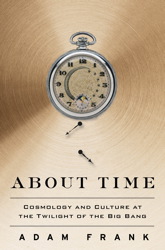Cosmology
is a fascinating field to read and think about. And whenever I do, I
am overwhelmed by two contradictory feelings about myself and my
relationship with the universe. I feel both small and big at the same
time. Small because my whole existence, my life, worries,
achievements, thoughts and dreams combine to much less than a mere
speck, a fragment of a fragment when seen in the enormously big
picture, the canvas of our universe (which in turn may only be a
speck within the even greater multiverse).
Yet it
also makes me feel big because of my fortunate place in this whole process and
evolution. In fact, my own personal existence is intricately linked
to the Big Bang, the birth of our universe. My own body is stardust,
dipped in and made from particles that have been shaped the way
they are through a process of billions of years! At the same time, it is
also our previous cultures, the combined and shared history of our
humanity that have led us to this particular moment, through their
inventions, efforts, and most importantly, imagination.
Adam
Frank in his book About Time: Cosmology and Culture at the
Twilight of the Big Bang has tackled a highly ambitious
undertaking here because he is linking our own evolution as a species
to the creation and development of technology. As he himself
reinforces various times in the course of the book the two, evolution
and technology, affect each other in mutual and reciprocal ways. Put
differently, we are where we are, namely our current scale and status
of our evolution and technological progress, not to say prowess, due
to the achievements of our past, the cumulative work of our
ancestors.
Our
humanity started with simple tools, drawings and myths that have
turned into complex and sophisticated gadgets filled with even more
possibilities for the future. Along the way, we both shaped and were
shaped by technological invention and scientific discoveries. Newton
gave us a paradigm that people lived by until it was shattered by
Einstein's theory of relativity with the development and subsequent
implications of quantum mechanics.
The
most original part of Frank's thesis is to point the arrow of
progress in two directions, that is "up" and "down." He claims that
material engagement, the needs and wants of a particular people at a
particular time led to the development of necessary technology, while
at the same time, the new technology itself directly affected perception of time and culture.
Hence, in terms of time, for example,
the downward movement has been changing our perception of
time in everyday life, whereas its upward movement has influenced our ideas about time in
relation to philosophy, physics and cosmology, which in turn also affects
our lives in significant ways.
On
this epic journey we then encounter pretty much everything from
radio, television, washing-machines, Internet and GPS. Some of them
are based on daily necessities, others have sprung up due to new
discoveries in science, yet each discovery on its own has left an
indelible mark on our consciousness reshaping our life and culture.
Yet
among all these inventions, the most relevant one must be the clock.
The moment time became precise and countable, in fact, even a
physical embodiment and reality of our lives, our paths toward
discovery and innovation accelerated significantly. Time has become the essence in our digital age.
Our whole day, not to say life, is
structured - some might say enslaved - by time. Time is money; time is running out; don't waste my time; we are a
time-obsessed culture that simply never has enough time despite all
those time-saving gadgets. This obsession over time as we experience
it today is rather a modern idea, something that previous cultures
lacked, for better or for worse.
For a
clear and wide-ranging overview of how culture, time and cosmology go
hand in hand, I recommend this well-researched, informative and
entertaining book. Although it tends to become a bit didactic towards
the end, the book's indisputable strength lies in spinning the
narratives of human culture and tying it with the history of
cosmology.
It is fascinating to see how one idea and discovery led to
another; how we all live and move in this web of time and technology. This is followed by Frank's optimistic and open-minded invitation to
continue rebuilding and refining our theories about the universe,
something from which, in the end, everyone, not only the scientists,
will benefit.






